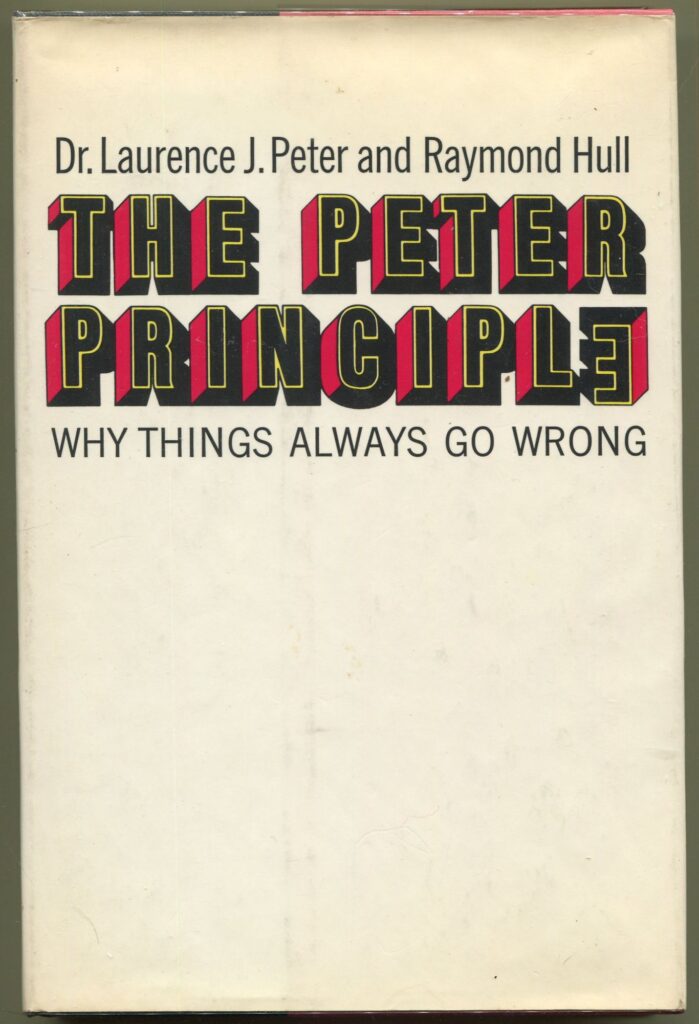Sometime in the late 1930s or early 40s, a newly minted Canadian schoolteacher by the name of Laurence J Peter saw a door sign in the august institution he was then employed at. It said: ‘Emergency Exit. Authorised Personnel Only’.
That aroused Peter’s curiosity. He looked around some more and saw another sign of similar intellect. This one said: ‘Emergency Exit. Not To Be Used Under Any Circumstances’. Peter went to the library and noticed that “all the books on pregnancy were stored on a shelf down by the floor, where the people who needed them the most couldn’t even see them”.
That set Peter on the path of some thinking, and some writing, and, eventually, to a book that sold a few million copies.
Not everyone is familiar with Peter and the book I am talking about. But I am pretty sure we have all tripped over what Peter was gently shaking his head at all those years ago: incompetence. It is so universal, so omnipresent, that people are beginning to confuse it with God. All right, that might be just me. But you have to admit that we are surrounded by an astonishing amount of incompetence. We usually shake our heads and make some half-assed attempt to change the status quo only when said incompetence is of gigantic proportions and mixed with shamelessness—like, say, a Boris Johnson or a Nadhim Zahawi (no, not Trump—he is post-incompetent). Otherwise we barely notice it, let alone do any head-shaking.

Where Peter stands apart from you and me is in that he did more than shake his head. In 1960, he propounded a ‘principle’ which explained, rather neatly, why “occupational incompetence” flourishes. Peter called it the Peter Principle, and stated it thus:
In a hierarchy, every employee tends to rise to his level of incompetence.
Isn’t that interesting? Peter’s argument, in essence, is that in every organisation promotions are based on competency in current position, not the potential for the promoted one. And that people keep getting promoted up the hierarchy to positions they can’t fill competently. His fundamental critique here, if we were to look under the hood a little, seems to be of the inability of bosses—arguably incompetent incumbents—to differentiate between functional, managerial, and leadership competencies (which is no surprise, given that many bosses often confuse managing with leading). The assumption that hierarchies make is that if you are a good mechanic, you’ll make a good foreman. Or if you are a good salesman, you’ll make a good sales manager. What this leads to is a situation where, in time, “every post tends to be occupied by an employee who is incompetent to carry out his duties”.
You might wonder then, if all hierarchies—governments and corporates and trade unions and the UN and universities and media houses and the military—are full of incompetents, how do we survive? Surely some work is getting done somewhere? Peter has an answer for that: work gets accomplished ”by those employees who have not yet reached their level of incompetence”.

Why I hold Peter in such high esteem is not merely because of the universality and timelessness of his wisdom. That is expected of any classic. It is not even the fact that Peter amassed 14 rejection slips—two more than J K Rowling for Harry Potter—before he could, in 1968, find a publisher for The Peter Principle in William Morrow. No, what makes Peter particularly appealing, I think, is how—and also where—he chose to deliver his message. Not many scholars—Peter was Dr Peter by the time the book came out, co-authored with journalist and author Raymond Hull, with a doctorate in education from the Washington State University—would risk packaging a couple of decades of their work into a satire.
Yes, The Peter Principle, when it got published in book-form in February 1969 was 179 pages of rip-roaring roast, served on a platter of exceptional conceptualisation. Satire seldom slips from the sword of a scholar; so when it does, smoothly, skilfully, it calls for loud applause. I suspect this owed, in no small measure, to the irreverent journalist who slept within Hull, but it is inconceivable that Peter, as the lead author and chief conceptualiser, is in any way less culpable. Think about it for a second and I am sure you will, like me, quietly chuckle at the idea of writing competently about incompetence—satirically.
So far I have spoken much of the form that The Peter Principle took without really exposing you to the ‘fun’ of that form. The best illustration of that—also why Peter, in my humble opinion, is the Pete Mitchell among academic top guns—is perhaps where he first chose to put forth his theory. Peter was speaking at a seminar, addressing a bunch of colleagues, who had just been promoted as directors of federally funded research projects—well, it is best told in Peter’s own words, excerpted from the foreword he wrote for a UK edition of The Peter Principle:
“Because each participant had written a successful grant proposal, each had been rewarded by a promotion to a position as director of one or more research projects. Some of these men actually had research skills, but this was irrelevant to their acquiring the directorship. Many others were inept at research design, and, in desperation, were simply intending to replicate some of oft-repeated statistical exercise.
“As I became aware of their plan to spend tax-payers’ money on rediscovering the wheel, I decided to explain their predicament by introducing them to the Peter Principle. Their reaction to my presentation was a mixture of hostility and laughter. A young statistician in the group convulsed with laughter and literally fell from his chair. Later he confided that his intense reaction was caused by my humorous presentation of outrageous ideas while at the same time he was watching the district research director’s face turn red, then purple.”
A little more context is perhaps needed to appreciate the full scale of Peter’s exploit. This was September 1960. Peter was still three years away from his doctorate. And here he was not just lecturing a room full of freshly promoted, grant-swollen directors, but pretty much butchering some of them, holding up the Mirror of Incompetence to purple faces. In the education sector, where much myth-making swirls around doctorates and grant successes, this must have taken an uncommon measure of genetiliac grit. What I would have given to be in that room!
In the 54 years after the publication of The Peter Principle, it has graced the reading list of many esteemed management courses, though how many MBAs have actually read it is perhaps an embarrassing question to ask. It has attracted some serious research certainly. A particularly noteworthy work is by the eminent economist Edward P Lazeaor who, with the aid of some very impressive statistical formulae too complicated to reproduce here, argued (I think) that the Peter Principle is real in a 2004 paper in the Journal of Political Economy. More recently, in another study that I am incompetent to comprehend (but suitably impressed by), Alan Benson, Danielle Li and Kelly Shue put the principle to a full court press. After some mesmerising statistical drills on sales transactions and promotion data of 38,843 workers across 131 firms, they came to the conclusion that organisations (still) continue to labour under the Peter Principle. They also proved that its impact could be quantified if you have enough time, energy, and SPSS access. Thus is it that they write in the Quarterly Journal of Economics: firms are “substantially more likely to promote top salespeople, even when the workers make worse managers on average and on the margin. This behaviour results in firms promoting workers who decrease subordinate performance by 30%, relative to a promotion policy that optimises match quality”.
Such evidence aside, the value of Peter’s work could also be seen to arise from its sheer expansiveness. Peter seems to have overlooked no promotional contingency. While writings about him have largely focussed on his principle per se (which he eloquently captures in the evocative phrase ‘The cream rises until it sours’), the ‘corollaries’ to it that construct the rest of the book—and his other works such as The Peter Plan and The Peter Prescription—are no less brilliant. There is absolutely no exception to the Peter Principle, he writes, and it “applies to all employees in all hierarchies”. Peter then goes on to explain the ”apparent exceptions“, the times when a promotee may seem to have escaped the parameters of his principle.
And so we have such delightful Peterianisms as the percussive sublimation (a pseudo promotion to move an incompetent from one unproductive position to another); professional automatism (think ‘computer says no’ and you get the idea); hierarchical exfoliation (a paradoxical explanation of why, to many bosses, “supercompetence is more objectionable than incompetence”); hypercanineophobia complex (fear your underdog may topple you); rigor cartis (the masking of incompetence by constructing flow charts and the like, and a stubborn insistence on ‘due process’); final placement syndrome (pathology associated with the promotion to the highest level of incompetence—think David Brent in The Office); and—my all-time favourite—creative incompetence (feigned incompetence to avert an offer of unwanted promotion).
In Why Things Go Wrong, Peter writes of how he employed creative incompetence to escape being promoted head of department, an elevation his dean was trying to push on him. This he did by throwing darts when the dean came by to his office to consult him on a technical matter—I strongly recommend this to those fortunate enough to have deans—and providing an answer based on the number he had impaled on the wall. According to Peter, the dean didn’t catch on to him, being of Sheldonian disposition. Peter concludes the anecdote with a killer one-liner that would put P J O’Rourke to shame: “This dean was so humourless that even the other deans noticed it.”
For those of us in hierarchies (particularly with easy access to darts), Peter’s ideas open up several enticing avenues. One of his most valuable offerings perhaps is that, in a world where hierarchies seem to increasingly push us all into competence-strutting (my coinage, not Peter’s), his ideas can help ground us a little. The Peter Principle reminds us not to take ourselves too seriously, not to swell up too much at our own successes and the stories we tell ourselves—to approach elevation and ambition with humility and humour. I will leave you with one last quotation from Peter: “Competence, like truth, beauty and contact lenses, is in the eye of beholder.”
An abridged version of this article appeared in The Hindu on 2 April 2023.

Previous Next